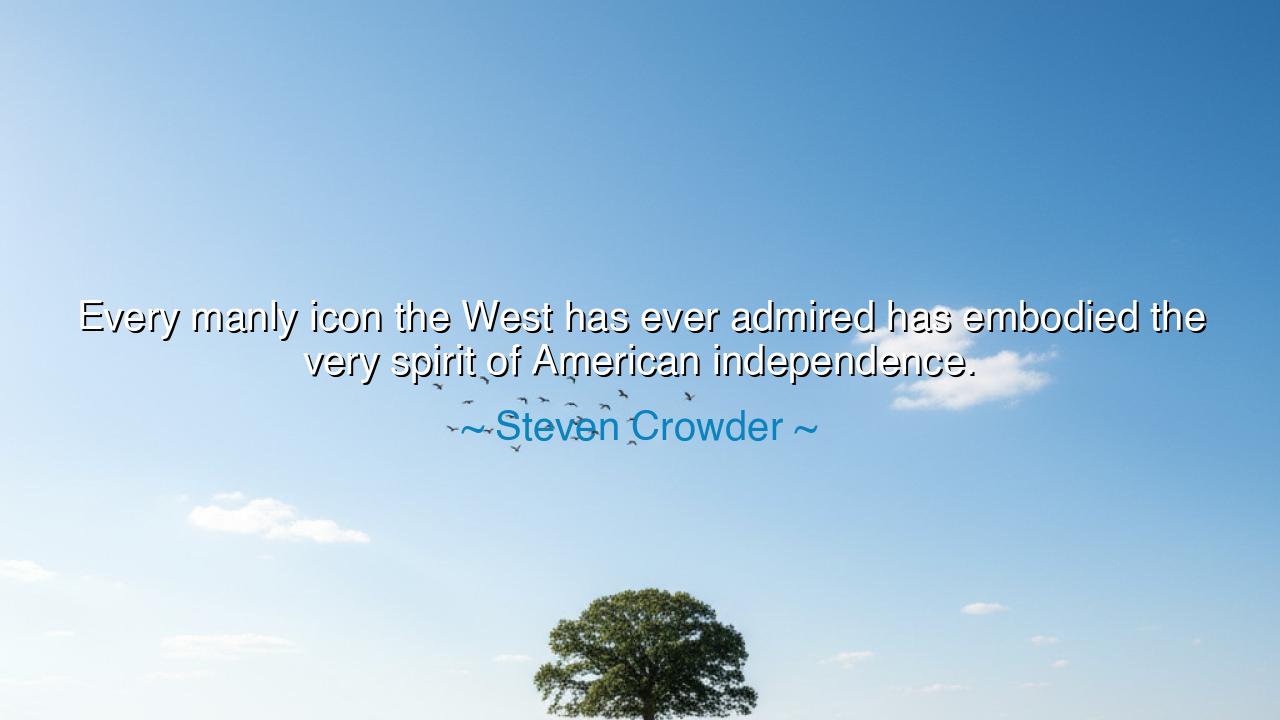
Every manly icon the West has ever admired has embodied the very
Every manly icon the West has ever admired has embodied the very spirit of American independence.






The words of Steven Crowder, when he said, “Every manly icon the West has ever admired has embodied the very spirit of American independence,” speak to an ancient and enduring truth — that independence is not merely a political condition, but a virtue of the soul. His words call forth the image of men who stood tall not because they were born into freedom, but because they chose it — men whose courage and conviction made liberty more than a word, but a living force that shaped nations. Beneath this reflection lies a deeper current: the idea that true manliness, as celebrated through the ages, is not found in dominance or pride, but in the steadfast pursuit of self-reliance, honor, and principle.
For from the earliest days of the American West, the figure of the independent man has been the very heartbeat of its mythology. The cowboy who rides alone across the plains, the soldier who stands his ground at the frontier, the inventor who builds in the quiet of his workshop — these are not merely symbols of masculinity, but embodiments of freedom’s will. They represent the spirit that refuses to bow, that dares to act where others shrink, that believes destiny is not bestowed but forged. Crowder’s words remind us that in the Western imagination, independence has always been the measure of greatness — not just the independence of nations, but of character.
Consider the figure of Abraham Lincoln, born in a humble cabin, self-taught, self-forged. In him burned that very spirit of independence which Crowder praises — the spirit that rises not because of wealth or inheritance, but because of conviction. Lincoln’s manliness was not of muscle, but of mind and moral courage. He faced the tearing of a nation, the hatred of foes, and the burdens of conscience — yet he stood firm, guided not by the praise of men but by the inner voice of duty. When he freed the enslaved and preserved the Union, he proved that independence is not only the right to stand apart, but the strength to stand for what is right.
And before him, recall George Washington, who could have been a king and chose instead to be a servant of liberty. When victory came after long years of hardship, and the new nation sought to crown him, he refused the crown. His greatness lay not in conquest, but in restraint. He understood that true freedom can only live where the will is disciplined, where the man governs himself before seeking to govern others. Washington embodied that quiet, noble strength that defines the American spirit — the courage to fight for freedom and the humility to protect it from tyranny, even from oneself.
Crowder’s words also remind us that independence is not a solitary pursuit. The icons of the West — from pioneers to presidents, from writers to warriors — were not isolated souls, but individuals whose self-reliance became the foundation upon which communities were built. They proved that personal freedom and collective strength are not opposites but partners. A man who governs himself gives stability to others; a man who works diligently for his own sustenance contributes to the prosperity of all. In this way, the spirit of American independence has always been both personal and communal — the harmony of individual effort and shared destiny.
But in our modern age, this sacred balance is in peril. The world tempts us with comfort in place of courage, dependence in place of responsibility. Many seek strength in numbers rather than in character, forgetting that the strength of a nation is born first in the hearts of its citizens. To embody the spirit of independence today is not to reject others, but to master oneself — to think freely, act rightly, and stand firm in truth even when the crowd falters. Crowder’s reminder is not nostalgia for a vanished age, but a summons to restore the virtues that built the West: courage, discipline, dignity, and self-reliance.
So, O listener, take this teaching into your heart. Be as the icons of old — not in their attire or fame, but in their spirit. Seek to earn what you desire, to protect what you love, to speak truth when it costs you comfort. Stand with humility, but stand firm. Let your actions be guided by conscience, not convenience; your strength by principle, not pride. For every time a person chooses integrity over ease, discipline over indulgence, and freedom over fear, the ancient flame of American independence burns anew.
Thus, the lesson endures: the spirit of independence is not born in governments, but in souls. It is the fire that lit the forge of the West, the resolve that carried nations through war and peace alike. To live by it is to live as those men and women who shaped the world with courage — not because they were admired, but because they were true. Let that spirit live in you, and you will become not merely a product of your time, but a guardian of liberty’s eternal light.






AAdministratorAdministrator
Welcome, honored guests. Please leave a comment, we will respond soon